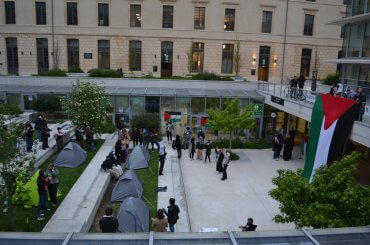The firing of a veteran Associated Press (AP) cameraman is causing a stir in Palestine after allegations that the Palestinian Authority (PA) had a hand in the matter.
Eyad Hamad, a Bethlehem-based journalist who has been with AP for 20 years, was fired from his post this week after PA police allegedly filed a complaint to the company accusing Hamad of “incitement, abuse, and the threat of using violence.”
Though the PA has publicly denied any involvement, the company listed the PA’s complaint as the final straw that led to Hamad’s termination.
In the letter sent to Hamad by AP, which was obtained by Mondoweiss, AP bureau chief for Israel and the Palestinian territories Josef Federman lists off a series of company policy “violations” committed by Hamad over the past year.
The majority of the violations listed by Federman concern Hamad’s “inappropriate” social media posts commenting on Palestinian political leaders and involvement in protests against Israeli and PA violations against Palestinian journalists, among them his participation in a demonstration against the Israeli shooting of Palestinian journalist Muath Amarneh in the eye.
“As you know, the associated press requires its employees to display strict neutrality in their professional work and public activity,” the letter reads.
“Yet after numerous warnings over the past year, you have continued to violate this basic principle of our work,” Federman writes.


Personal spat gone wrong
While the letter from AP argues that a number of instances, including which Hamad allegedly threatened one of his fellow colleagues, led to his termination, Hamad and fellow journalists say the catalyst for his termination was a personal spat between Hamad and PA police spokesperson Luay Irzeiqat.
According to a number of local journalists, Hamad’s problems began after he kicked Irzeiqat out of a Whatsapp group of local journalists, supposedly due to the fact that Hamad didn’t want government officials in the group.
“After he kicked him out of the group, Irzeiqat began threatening Hamad, saying that he was going to call AP and get him fired,” Thaer Fakhouri, 31, a freelance journalist from Hebron, and a member of the Whatsapp group in question, told Mondoweiss.
In the same week, Palestinian authorities arrested a young journalist, Anas Hawari, who worked with the Hamas-affiliated Quds News Network.
The violent detention of Hawari, who was reportedly beaten and required hospitalization as a result of his arrest, caused uproar within the journalism community in the West Bank, who are often the targets of PA censorship and arrest campaigns if they are found to be critical of Mahmoud Abbas’ government.
Sources allege that following the arrest of Hawari, Hamad reportedly sent a number of voice messages to PA security officials, including Irzeiqat, condemning their actions and threatening to burn tires in front of the local courthouse in protest of Hawari’s detention.
Hamad then participated in a demonstration against Hawari’s arrest outside a PA government building, holding up a poster that read: “President Mahmoud Abbas, I demand protection from the [Palestinian] security agencies.”
In the termination letter sent by AP, Federman mentions that the PA complaint against Hamad included the supposed threat to burn tires. Federman also rebukes Hamad’s role in the protest and his accusations against the PA of corruption and “hinting that they were collaborators.”
“Eyad wasn’t just trying to make a point about Anas’ arrest, but about the violence used by the Palestinian police,” Fakhouri told Mondoweiss, adding that Hamad has long been vocal about rights violations faced by Palestinian journalists, both by the Israeli and Palestinian governments.
“The same thing goes for Muath,” Fakhouri continued, referring to the case of Muath Amarneh. “Eyad wasn’t just standing up for him as a journalist, but as a human being that was wrongfully shot in the eye.”
“I don’t think standing up for human rights, even as a journalist, should be a crime. Especially not one that gets you fired from work,” Fakhouri said.
Double standards
The local response to Hamad’s termination has been one of anger and shock: both towards AP for firing Hamad under what many consider unfair circumstances, and the apparent involvement of PA officials.
In regards to Hamad’s termination, the AP told news outlets that it did not comment on “personal matters.” Meanwhile, the PA has continued to deny knowledge of any complaint that was filed against Hamad to the company.
Local journalists and activists took to social media to demand Hamad be returned to his post, while the Palestinian Journalist Syndicate (PJS) condemned the “arbitrary dismissal” of Hamad and called on AP to reverse its “unfair and unjust decision.”
“As a Palestinian journalist, I am worried about the repercussions of this,” Fakhouri told Mondoweiss, saying that many of his colleagues have expressed fear that the PA could wield its power to influence local and international media companies to terminate anyone who speaks out against them.
“I have been arrested seven times by the Palestinian government because of my work with companies affiliated with rival political factions,” Fakhouri said.
“All we want as journalists is to be able to show the world what is happening on the ground here without fear of imprisonment by the PA in the West Bank or by Hamas in Gaza.
A common theme among many criticisms of AP’s decision was the feeling that were it an Israeli journalist in Hamad’s position, the situation might have turned out differently.
When asked if he agreed with that sentiment, Fakhouri said “yes, i do believe it might be different if he weren’t Palestinian.”
“A lot Israeli journalists were once Israeli soldiers who shot and killed Palestinians on a daily basis,” Fakhouri said, adding that “some of them still serve in the military reserves.”
“How is it ok to participate in a military apparatus that commits war crimes and be an ‘impartial’ journalist, like AP prides itself on being?” Fakhouri asked.
“Why is standing up for human rights and press freedoms ground for being fired, but Israeli human rights violations not?”


